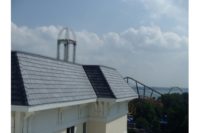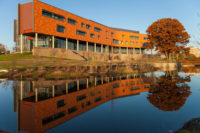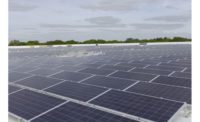The 4,800-square-foot residence in Glencoe, Ill., is the first new home in Chicago’s North Shore area to achieve LEED Platinum certification. It's also one of the few LEED homes to take a non-modernist approach to its exterior.
“It's not some far out, spaceship design," said general contractor Scott Simpson, president of Scott Simpson Builders in Northbrook, Ill. “It's actually quite traditional in its appearance.”
Designed by Kipnis Architecture & Planning of Evanston, Ill., the home is classic in its style, form and proportion and yet modern in its use of materials, colors and systems. The home also offers an affordability message. “A green home doesn't have to be crazy expensive,” said Nathan Kipnis, AIA, principal of the firm. “Even though this is a LEED Platinum home, it was built at a competitive market-rate cost, essentially comparable to the neighboring homes.”
The owners of the home were the driving force behind the effort to go for LEED Platinum. “They kept pushing us to go as high as it made sense,” Kipnis said. “They wanted to show people that an extremely green house could be done with a nice design that would fit into a traditional neighborhood and wouldn't have to cost a fortune.”
The standing seam metal roof was a key element of the sustainable design. Approximately 600 square feet of 24 gauge PAC-CLAD material from Petersen Aluminum, Elk Grove Village, Ill., was fabricated and installed by Cedar Roofing Company of Lake Forest, Ill. The Silver Metallic Kynar 500 coating offers one of the highest reflectivity and Solar Reflectance Index (SRI) ratings of all of the PAC-CLAD colors, and it is one of 31 PAC-CLAD finishes that are Energy Star approved.
The roof provides many green features. “The roof shape is asymmetrically arranged to collect as much storm water as possible. And the roof is sloped at two different angles — the summer angle and the winter angle,” Kipnis said. The steeper south-facing roof supports the solar thermal panels, optimized for the low winter sun. The shallower south-facing section of the roof includes solar PV panels, whose electrical production is maximized for the middle of the day in the summer as a CO2 reduction strategy. The roof design also includes a ventilation tower with transom windows that provide airflow to the upstairs when the lower windows are open.
“Each section of the roof is doing something very specific for us — very thought out. You can’t get much more action out of a roof than that,” Kipnis said. “When our client said 'give me a roof that I will never have to replace,' we thought metal immediately. We like metal roofs. And the Petersen 20-year finish warranty gives us great confidence. In fact, we have a third project underway right now that will include a Petersen roof.”
Other green features of the home include natural daylighting, radiant floor heating, cement fiberboard siding, passive whole-house ventilation, rain barrel water collection system (the metal roofing products provide an excellent surface for rainwater harvesting), closed-cell foam R-40 walls and R-55 roof, integrated app-controlled ultra-high efficiency HVAC systems, and native/low maintenance landscaping.
The home achieved a HERS rating of 32, which identifies the home as designed to use only 32 percent of the energy of a "standard" new home. “This may be one of the most sustainable houses in the country,” Simpson said.
Both Simpson and Kipnis, who have worked together on previous projects, reiterate the importance of the homeowner's involvement in the project and commitment to environmentally friendly construction. And both agree that the PAC-CLAD metal roof was an important contributor toward successfully achieving LEED Platinum certification.
Petersen Aluminum products are an integral component of energy efficient and sustainable structures — commercial and residential alike. As with the Glencoe residence, metal roofing provides a platform for the installation of a variety of solar panels. Additionally, PAC-CLAD steel and aluminum includes a high percentage of recycled materials and, at the end of the extended service life, are 100-percent recyclable to reduce the solid waste stream to landfills. Petersen’s wide range of color options offer high SRI ratings, which can mitigate the Heat Island effect. All of these factors contribute to outstanding energy efficiency of the building envelope.
For more information, visit www.pac-clad.com.






Report Abusive Comment